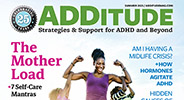When You’re So Sensitive It Hurts
After a lifetime of judgment and blame, many adults with ADHD are understandably sensitive to criticism. It cuts deep and often provokes angry retorts we later regret. How to respond more calmly and ignore what doesn’t matter.

ADHD makes us more sensitive to criticism. Often, our first instinct is to respond defensively or angrily to outside comments that feel like disapproval. But adults with attention deficit disorder (ADHD or ADD) should know that doing so could sacrifice learning opportunities and the respect of others.
So here is some expert advice to help adults with attention deficit respond effectively to critiques and criticisms.
When Criticism is Valid
Acknowledge and paraphrase. After receiving criticism, adults with ADHD should first acknowledge any truth in the statement. When you think the criticism may be justified, get on the same page with the other person by paraphrasing his comments.
Learn from it. If a “thank you” or explanation seems appropriate, address it briefly, and then move on. Adults with ADHD have a tendency to dwell on the criticism — don’t! Instead focus on ways you can learn from it.
When Criticism is Inaccurate
Agree with it — in part. When responding to an inaccurate criticism, it’s often best for adults with ADHD to try “fogging” — agreeing with only part of the criticism rather than getting defensive or mad.
[Free Download: 15 Ways to Disarm (and Understand) ADHD Emotions]
Example: If someone says you are undependable you can respond with “Yes, I might be undependable at times.” Or agree with the principle behind the criticism, such as “You’re right, being late is undependable.” This technique allows you to gracefully deflect the criticizer while also brushing off their implied judgments.
Improve Your Response
Ask questions. A lot of criticism is vague and needs to be clarified before you can decide how to respond. It can be especially difficult for adults with ADHD to control emotions, but try to clarify details before you react. Stay away from “why” questioning and use “how,” “what,” “where” and “when” questions to clarify the details.
Example: If someone says that what you are doing annoys them, ask specifically how it is annoying and when it annoys.
Practice. Oftentimes people with ADHD receive so much criticism that they begin to react angrily and aggressively when criticized. Other times, adults with ADHD may become passive to others’ actions toward them.
Which ever response you have, keep in mind that practice makes perfect, and the first few attempts at responding in a new way may be awkward and not received as well as you had hoped. Hang in there, and keep trying until you become comfortable and relaxed with your new options for responding.
[Silence Your Harshest Critic — Yourself]
Stand Your Ground — Gracefully
Here are three ways to help you to stand your ground without provoking anger or setting someone up to respond defensively.
1. Broken Record Response: Calmly and slowly keep repeating in a monotone voice without particular emphasis on any one word or phrase, what it is you have to say, until it is recognized and received appropriately by the other individual.
2. Emphatic Escalation: Calmly and slowly restate your response or request, with more assertion each time you do so, but without becoming aggressive. Always remember to be polite when asking for clarification and say “please.”
3. Sensitive Listening: First acknowledge the other persons point of view respectfully and then make your point of view clear. Avoid using the word “but.” Restating the other person’s point of view, followed with a “but” negates what you just said. Instead, follow it with the word “and” to prevent the other person from becoming defensive or tuning you out.









